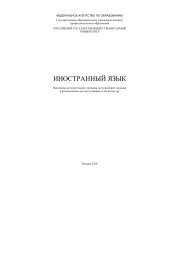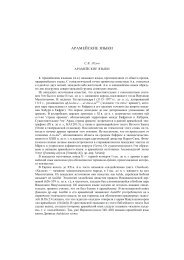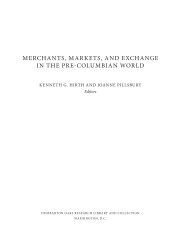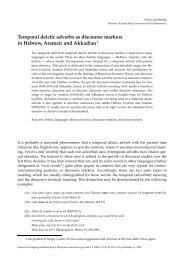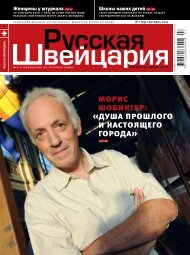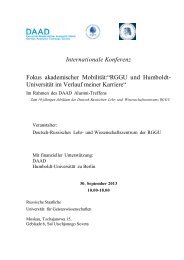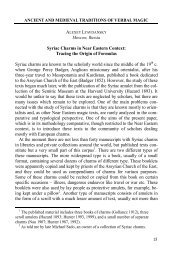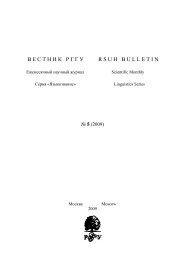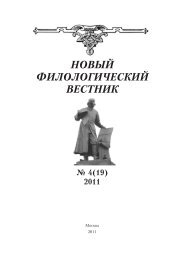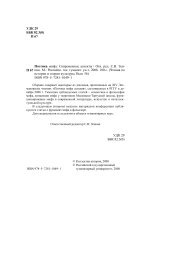Akkadian Sentences about the Present Time (II/2)
Akkadian Sentences about the Present Time (II/2)
Akkadian Sentences about the Present Time (II/2)
Create successful ePaper yourself
Turn your PDF publications into a flip-book with our unique Google optimized e-Paper software.
772 Morphosyntax and Text Structure in <strong>Akkadian</strong>“being-taken” is hardly ever observable, <strong>the</strong>refore <strong>the</strong> SC P of leqûm is notparticularly frequent, <strong>the</strong> passive of leqûm being coded by <strong>the</strong> N-stem,which looks productive in both OB and OA (see CAD L 147). Note that<strong>the</strong> MA and NA P usages mentioned above are all technical and (in thissense) idiomatic.No proper VA, except for a noun leqû ‘adoptee’ in SB lexical texts(CAD L 130f.). Again, this fact is explained by my Anschaulichkeit-criterion,as applied to resultative adjectives.(44) maārum ‘to accept, receive, meet’In OB, <strong>the</strong> SC A is common in legal passages of letters, it means ‘somebodyhas (got) something’ (cf. Kouwenberg forthcoming 7.3.2 with a referenceto Rowton 1962, see examples in <strong>the</strong>se studies and CAD M 1 53).O<strong>the</strong>rwise, semantically more or less predictable tokens of <strong>the</strong> SC A arerare, <strong>the</strong>y appear in literary texts. Cf. an example from <strong>the</strong> Etana epic:erû ma-i-ir ukultam kīma ni-ši-im na-e-ri emūqam īšu ‘<strong>the</strong> eagle took food,he gained strength like a raging lion’ (Bab. 12, pl. 12 vi 3f. = CAD N 1151a). 32 In <strong>the</strong> rest of A tokens, <strong>the</strong> subject is inanimate: dummuqtum maa-ra-su‘happiness is waiting for him’ (Kraus Texte 62rev.:9, an OBphysiognomic text), šumma ši-pu-um ti-bu-um ma-i-ir 33 ‘if <strong>the</strong> “footmark” isequal to <strong>the</strong> t.’ (YOS 10, 50:13 = CAD T 390b, a technical usage in extispicy).Note an idiomatic verb phrase X īnam (+ POSSESSOR) mair, lit.‘X meets somebody’s eye,’ i. e., ‘X pleases, is acceptable to somebody,’which is attested mostly in OB (CAD M 1 64). Within this phrase, <strong>the</strong> Pres.can also appear: ina kīm inanna ´ēnū nasqātum īnam ul i-ma-a-a-ra ‘rightnow (even) <strong>the</strong> choice sheep look terrible’ (AbB 14, 77:7ff., Veenhof ’stranslation). The SC P has not been found in OB letters, <strong>the</strong> only exampleknown to me comes from divination: ni-qí LÚ it -ti DINGIR ma -i-ir‘<strong>the</strong> sacrifice of <strong>the</strong> man has been received by <strong>the</strong> god’ (YOS 10, 17:1 =Jeyes 1984:43).7.3.3. Sure enough, this use of <strong>the</strong> SC is etymologically secondary, yet whe<strong>the</strong>r itis marginal in <strong>the</strong> corpus, is not obvious.32CAD E 158b has ‘<strong>the</strong> eagle, having been fed …’, N 2 196a has ‘<strong>the</strong> eagle, receivingfood …,’ both interpretations are inferior to <strong>the</strong> above one. Speiser’stranslation (ANET 114) ‘<strong>the</strong> eagle, having received <strong>the</strong> food … gained strength’ isto my mind <strong>the</strong> most precise of <strong>the</strong> four, since Speiser singles out this non-trivialuse of mair by means of <strong>the</strong> English Perfect Participle.33Sic, no accusative in this sentence!



